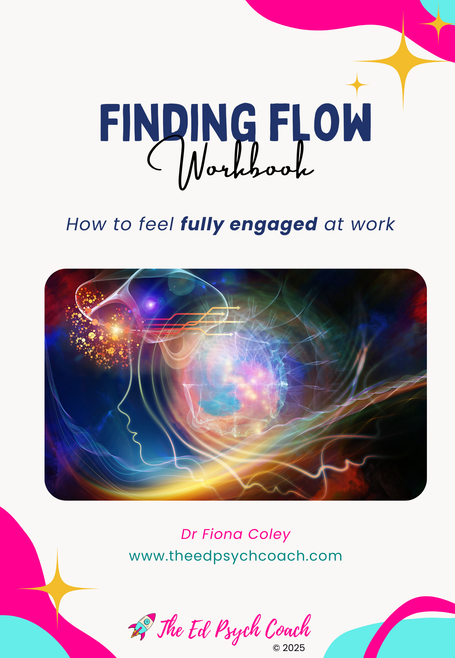
Finding Flow:
How to feel fully engaged at work
I am yet to meet an Educational Psychologist who has not come into this profession hoping to make a difference. But over time, the demands of the role can take over, leaving us feeling depleted and even disillusioned. Our work can easily start to feel like too much: reports pile up, consultations blur into one another and we become so focused on ‘doing’ that we lose sight of our reason for ‘being’ - seeking to help others and make a meaningful difference.
If you’d like to find a way to reconnect with what lights you up, and to feel more alive, energised and fulfilled in your role, you’re in the right place. You don’t have to stay stuck on the hamster wheel of getting things done.
A powerful way to achieve emotional renewal in your work and reconnect with joy, meaning and fulfilment, is through finding flow.
Flow, a concept developed by psychologist Mihaly Csikszentmihalyi (2002), is that state of being completely absorbed in what you’re doing. You lose track of time, your skills and the challenge are perfectly matched and you feel a deep sense of meaning and satisfaction. It’s not about working harder: it’s about working differently to create moments where your work becomes a source of energy, rather than depletion.
Why Flow Matters for EPs
Flow isn’t just a nice feeling; Csikszentmihalyi (2002) argues that it’s vital for our well-being. He outlines evidence that people who regularly experience flow are more motivated, more creative and more resilient. In a role like ours, where emotional intensity is real and burnout is a genuine risk, finding ways to create more flow can be the difference between surviving and thriving.
When you experience flow at work:
- You feel more focused and less scattered.
- You reconnect with the parts of your role that you love.
- You build emotional energy rather than constantly spending it.
- You leave work feeling fulfilled, joyful and uplifted, rather than drained and depleted.
Imagine finishing your day feeling satisfied and proud about what you achieved. Imagine waking up with that spark again and looking forward to deep, meaningful work instead of counting down to the next weekend or holiday.
That’s the gift of finding flow.
How to Find Flow
The good news is that we don’t have to passively wait for flow to visit us: we can creatively cultivate it. You can redesign your workday and shift your mindset to invite more flow. You can start by reconnecting with some simple but powerful elements of flow, such as:
- Setting clear, meaningful goals for each piece of work you do.
- Matching your tasks to your strengths and gently stretching your skills.
- Creating time and space for deep focus without distractions.
- Finding ways to make even routine tasks more engaging and purposeful.
Finding flow isn’t just about tricks and techniques: it’s about giving yourself permission to slow down, reflect and choose joy over constant busyness. It’s about remembering that you deserve to feel fulfilled, and you’re not just a cog in a machine.
Your next steps
If you’re ready to invite more flow into your professional life, check out my new practical and reflective workbook, Finding Flow. It’s full of structured reflection activities, inspiring prompts and coaching questions designed especially for EPs who want to find flow and enjoy making a meaningful difference.
Why not take this to your next supervision or coaching session to deepen your reflections and seek some supportive accountability for taking action?
Why not take this workbook to your next EP team meeting to spread some positivity and hope in our profession?
You deserve to find flow, feel inspired and enjoy your work.
Download the Finding Flow Workbook and start now...
P.s. If this blog resonated with you and you’d like further help in finding flow, I can be your supportive thinking partner. Through 1:1 coaching, we can create space for you to reconnect with what lights you up and plan your next meaningful steps forward. Find out more about coaching with me and get in touch.
References
Csikszentmihalyi, M. (2002) Flow: The classic work on how to achieve happiness. Rider.
© Dr Fiona Coley 2025
